10 Best Psychopharmacology Books

A solid library of books on psychiatric mdications is imperative to all mental health clinicians. If there were one topic that I feel most confident in recommending books, it would definitely be psychopharmacology. I have read a lot of good and a lot of bad books on this topic. Included below is a list of my favorite, most essential books on the topic of psychopharmacology.
Stahl’s Essential Psychopharmacology
By Stephen Stahl
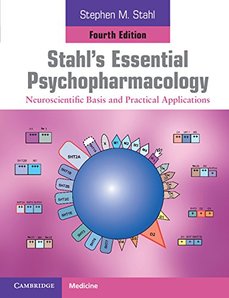 Summary: Gotta start with the basics! With this fully revised fourth edition of Stahl’s Essential Psychopharmacology: Neuroscience Basis and Practical Applications, Stahl returns to the essential roots of what it means to become a neurobiologically empowered psychopharmacologist, expertly guided in the selection and combination of treatments for individual patients in practice. Embracing the unifying themes of ‘symptom endophenotypes’, dimensions of psychopathology that cut across syndromes, and ‘symptoms and circuits’, every aspect of the text has been updated to the frontiers of current knowledge, with the clarity of explanation and illustration that only Stahl can bring.
Summary: Gotta start with the basics! With this fully revised fourth edition of Stahl’s Essential Psychopharmacology: Neuroscience Basis and Practical Applications, Stahl returns to the essential roots of what it means to become a neurobiologically empowered psychopharmacologist, expertly guided in the selection and combination of treatments for individual patients in practice. Embracing the unifying themes of ‘symptom endophenotypes’, dimensions of psychopathology that cut across syndromes, and ‘symptoms and circuits’, every aspect of the text has been updated to the frontiers of current knowledge, with the clarity of explanation and illustration that only Stahl can bring.
Philosophy of Psychopharmacology
By Dan Stein
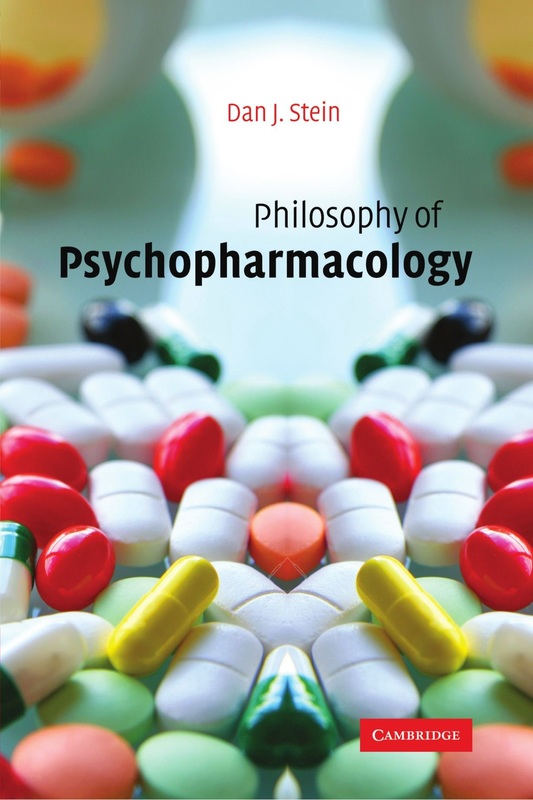 Summary: Psychotropic agents have been effective for the treatment of the emotional, and cognitive symptoms of serious psychiatric disorders. At the same time, the availability of such agents raises questions about the appropriate use of what might be termed ‘smart pills’, ‘happy pills’, or ‘pep pills’. Philosophy of Psychopharmacology volume argues that developments in modern psychopharmacology raise a range of important philosophical questions, and may ultimately change the way we think about ourselves. It provides a framework for addressing important philosophical issues in psychiatry and psychopharmacology.
Summary: Psychotropic agents have been effective for the treatment of the emotional, and cognitive symptoms of serious psychiatric disorders. At the same time, the availability of such agents raises questions about the appropriate use of what might be termed ‘smart pills’, ‘happy pills’, or ‘pep pills’. Philosophy of Psychopharmacology volume argues that developments in modern psychopharmacology raise a range of important philosophical questions, and may ultimately change the way we think about ourselves. It provides a framework for addressing important philosophical issues in psychiatry and psychopharmacology.
Successful Psychopharmacology
By Stephen Sobel
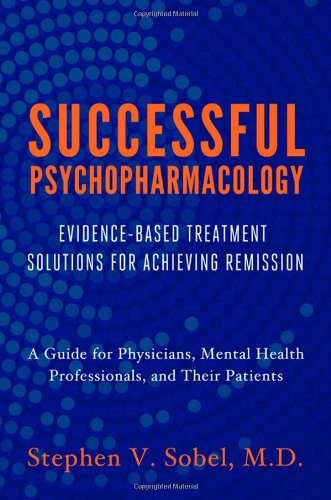 Summary: This book teaches mental health professionals how to choose and use psychotropic medications to address the biological etiology of psychiatric disease and mental health. Successful Psychopharmacology helps readers understand the key aspects of psychotherapy to deal with the psychosocial factors that prescribers need to know to use these medications within the context of the patient’s life. While I wish Sobel used more inclusive language regarding psychiatric nurse practitioner prescribers, I really value the quality of this book. It is a perfect book for a new PMHNP grad about to start his or her first job.
Summary: This book teaches mental health professionals how to choose and use psychotropic medications to address the biological etiology of psychiatric disease and mental health. Successful Psychopharmacology helps readers understand the key aspects of psychotherapy to deal with the psychosocial factors that prescribers need to know to use these medications within the context of the patient’s life. While I wish Sobel used more inclusive language regarding psychiatric nurse practitioner prescribers, I really value the quality of this book. It is a perfect book for a new PMHNP grad about to start his or her first job.
Prescribing Mental Health Medication: The Practitioner’s Guide
By Christopher Doran
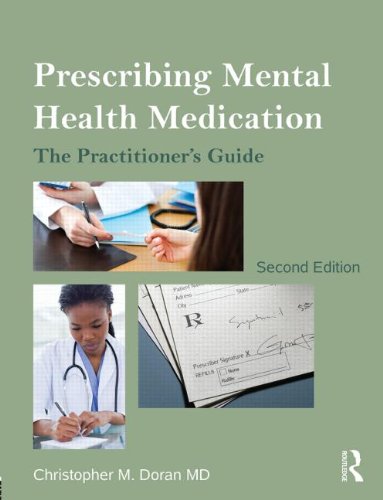 Summary: Prescribing Mental Health Medication is a text for practitioners who treat mental disorders with medication. It explains the entire process of medication assessment, management and follow up for general medical practitioners, mental health practitioners, students, residents, prescribing nurses and others perfecting this skill. Completely updated, this text includes information on all psychotropic medications in use in the United States and the United Kingdom. It incorporates clinical tips, sample dialogues for talking about medications to patients, and information specifically relevant in primary care settings. Hands down, this is THE BEST practical guide to psychiatric medication management. Bonus! The author is married to an NP!
Summary: Prescribing Mental Health Medication is a text for practitioners who treat mental disorders with medication. It explains the entire process of medication assessment, management and follow up for general medical practitioners, mental health practitioners, students, residents, prescribing nurses and others perfecting this skill. Completely updated, this text includes information on all psychotropic medications in use in the United States and the United Kingdom. It incorporates clinical tips, sample dialogues for talking about medications to patients, and information specifically relevant in primary care settings. Hands down, this is THE BEST practical guide to psychiatric medication management. Bonus! The author is married to an NP!
Managing the Side Effects of Psychotropic Medications
By Joseph Goldberg & Carrie Ernest
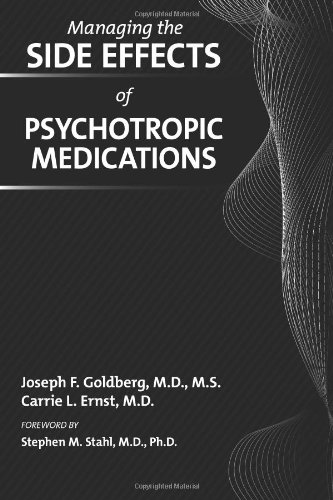 Summary: This text provides comprehensive, pragmatic information on anticipating and countering adverse drug effects when they occur. Managing the Side Effects of Psychotropic Medications is cowritten by a research psychopharmacologist and a consultation-liaison psychiatrist. This book fills a void in the literature, helping mental health practitioners assess the risks and benefits of specific psychotropic medications and undertake strategies for managing adverse effects.This book is an absolute must have for ANYONE prescribing mental health medication.
Summary: This text provides comprehensive, pragmatic information on anticipating and countering adverse drug effects when they occur. Managing the Side Effects of Psychotropic Medications is cowritten by a research psychopharmacologist and a consultation-liaison psychiatrist. This book fills a void in the literature, helping mental health practitioners assess the risks and benefits of specific psychotropic medications and undertake strategies for managing adverse effects.This book is an absolute must have for ANYONE prescribing mental health medication.
Pharmacotherapy of Child and Adolescent Psychiatric Disorders
By David Rosenberg & Samuel Gershon
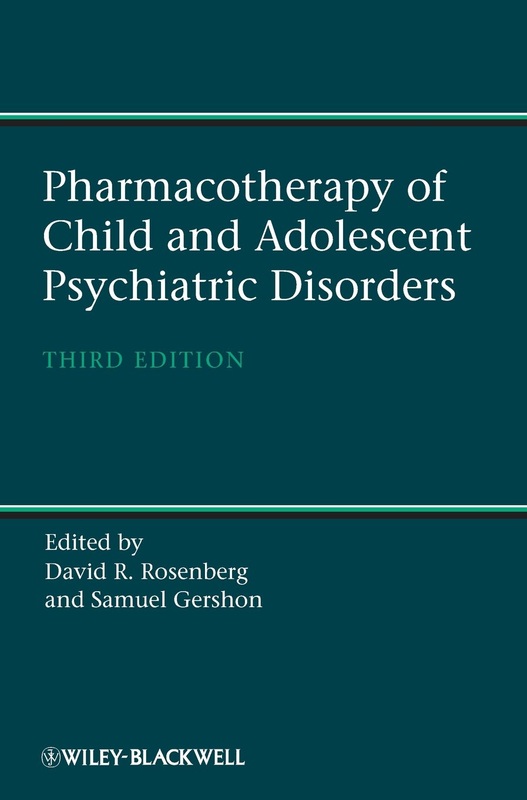 Summary: This book fulfills an urgent need for an updated text on pediatric psychopharmacology. It takes a unique approach in discussing recent findings within the context of current issues, including economic and political ones. The book covers the emerging question of treating children who do not yet meet diagnostic criteria for psychosis, , but who are deemed to be at high risk. Pharmacotherapy of Child and Adolescent Psychiatric Disorders reviews the impact of recent American Heart Association guidelines for monitoring children on stimulants and other psychotropics. This text unfortunately uses the DSM-IV, but I am hoping for an update soon because this is the BEST psychopharm book for children and adolescents (trust me, I’ve tried a lot!).
Summary: This book fulfills an urgent need for an updated text on pediatric psychopharmacology. It takes a unique approach in discussing recent findings within the context of current issues, including economic and political ones. The book covers the emerging question of treating children who do not yet meet diagnostic criteria for psychosis, , but who are deemed to be at high risk. Pharmacotherapy of Child and Adolescent Psychiatric Disorders reviews the impact of recent American Heart Association guidelines for monitoring children on stimulants and other psychotropics. This text unfortunately uses the DSM-IV, but I am hoping for an update soon because this is the BEST psychopharm book for children and adolescents (trust me, I’ve tried a lot!).
Clinical Geriatric Psychopharmacology
By Carl Salzman
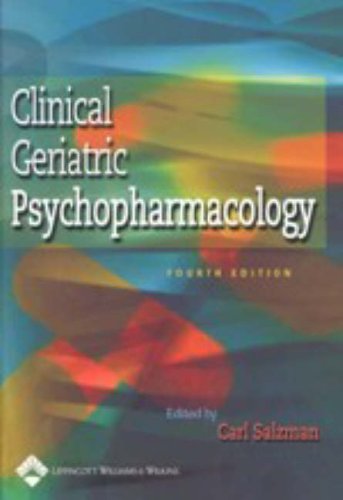 Summary: Unfortunately this book hasn’t been updated since 2004; however, it remains my absolute favorite geriatric psychopharm text. Clinical Geriatric Psychopharmacology is the most authoritative clinical reference on the pharmacologic treatment of psychiatric disorders in elderly patients. This book provides complete information on new psychotropic drugs, new uses for established drugs, and clinically relevant advances in the neurosciences. Four chapters cover genes, pharmacokinetics, and their impact on prescribing; new cognitive-enhancing strategies and drugs; late-life depression and physical illness; and depression and cardiac disease in late life.
Summary: Unfortunately this book hasn’t been updated since 2004; however, it remains my absolute favorite geriatric psychopharm text. Clinical Geriatric Psychopharmacology is the most authoritative clinical reference on the pharmacologic treatment of psychiatric disorders in elderly patients. This book provides complete information on new psychotropic drugs, new uses for established drugs, and clinically relevant advances in the neurosciences. Four chapters cover genes, pharmacokinetics, and their impact on prescribing; new cognitive-enhancing strategies and drugs; late-life depression and physical illness; and depression and cardiac disease in late life.
The Prescriber’s Guide
By Stephen Stahl
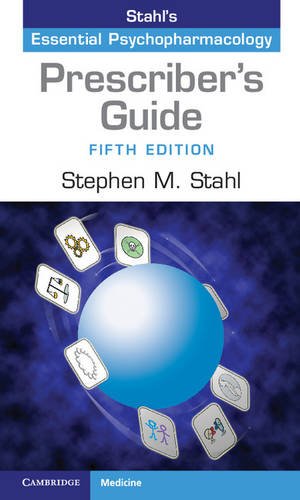 Summary: Can’t go without The Prescriber’s Guide. With its easy-to-use, template-driven navigation system, The Prescriber’s Guide combines evidence-based data with clinically informed advice to support everyone prescribing in the field of mental health. This text is used for reference and includes color images and short explanations. Every psychiatric presciber I’ve ever met keeps this book near them at all times. If I could make two suggestions to Dr. Stahl: 1) please improve the binding of this book…I always end up using mine to the point of pages spilling out all over the place, and 2) could you please include the “black box warnings” more clearly? Also, while I have you, I wanted to let you know that I call you the “rock star of psychiatry” to pretty much everyone I talk to. 🙂
Summary: Can’t go without The Prescriber’s Guide. With its easy-to-use, template-driven navigation system, The Prescriber’s Guide combines evidence-based data with clinically informed advice to support everyone prescribing in the field of mental health. This text is used for reference and includes color images and short explanations. Every psychiatric presciber I’ve ever met keeps this book near them at all times. If I could make two suggestions to Dr. Stahl: 1) please improve the binding of this book…I always end up using mine to the point of pages spilling out all over the place, and 2) could you please include the “black box warnings” more clearly? Also, while I have you, I wanted to let you know that I call you the “rock star of psychiatry” to pretty much everyone I talk to. 🙂
Integrative Neuroscience and Personalized Medicine
By Evian Gordon & Stephen Koslow
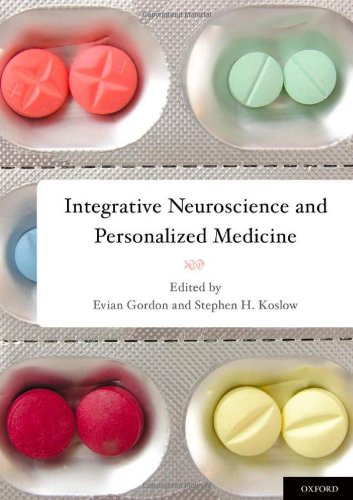 Summary: While not specifically about psychopharmacology, this is an excellent introduction to the future of personalized medicine, which without a doubt will strike psychiatry. Integrative Neuroscience and Personalized Medicine takes an in depth and hard look at the current status and future direction of treatment predictive markers for the brain from the perspectives of the researchers on the cutting edge and those involved in healthcare implementation. The contents provide a comprehensive text suitable as both a pithy introduction to and a clear summary of the “science to solutions” continuum in this developing field of Personalized Medicine and Integrative Neuroscience.
Summary: While not specifically about psychopharmacology, this is an excellent introduction to the future of personalized medicine, which without a doubt will strike psychiatry. Integrative Neuroscience and Personalized Medicine takes an in depth and hard look at the current status and future direction of treatment predictive markers for the brain from the perspectives of the researchers on the cutting edge and those involved in healthcare implementation. The contents provide a comprehensive text suitable as both a pithy introduction to and a clear summary of the “science to solutions” continuum in this developing field of Personalized Medicine and Integrative Neuroscience.
Psychiatric Pharmacogenomics
By David Mrazek
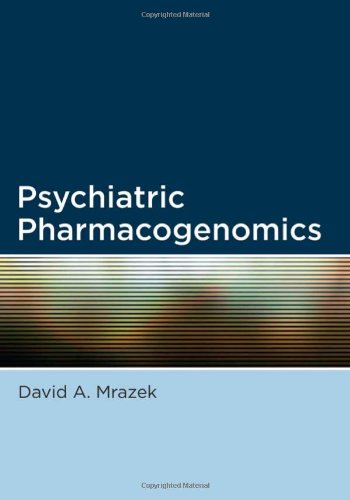 Summary: Psychiatric Pharmacogenomics is a book written to help clinicians to use pharmacogenomic testing to improve the pharmacotherapy that they provide for their patients. It is designed to teach clinicians how to order pharmacogenomic tests and interpret the results. Clinical examples are used to underscore the specific indications for pharmacogenomic testing and to clarify the clinical usefulness of identifying atypical genotypes that result in problematic responses to medication. Definitely not a “light” read, but utterly fascinating.
Summary: Psychiatric Pharmacogenomics is a book written to help clinicians to use pharmacogenomic testing to improve the pharmacotherapy that they provide for their patients. It is designed to teach clinicians how to order pharmacogenomic tests and interpret the results. Clinical examples are used to underscore the specific indications for pharmacogenomic testing and to clarify the clinical usefulness of identifying atypical genotypes that result in problematic responses to medication. Definitely not a “light” read, but utterly fascinating.
Share on Facebook Share on Twitter Share on Pinterest
2 Comments on "10 Best Psychopharmacology Books"